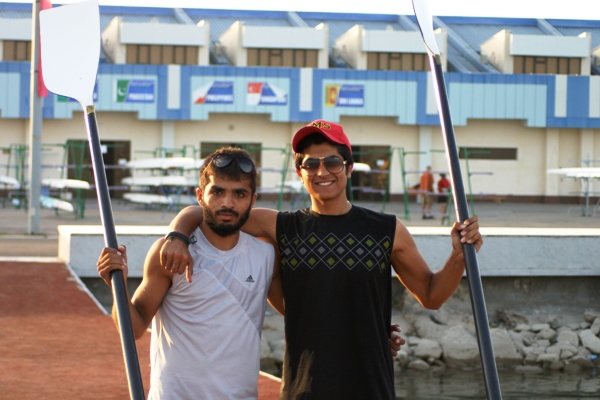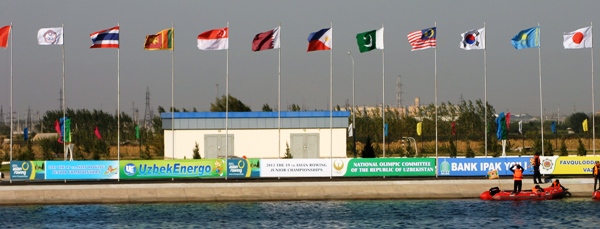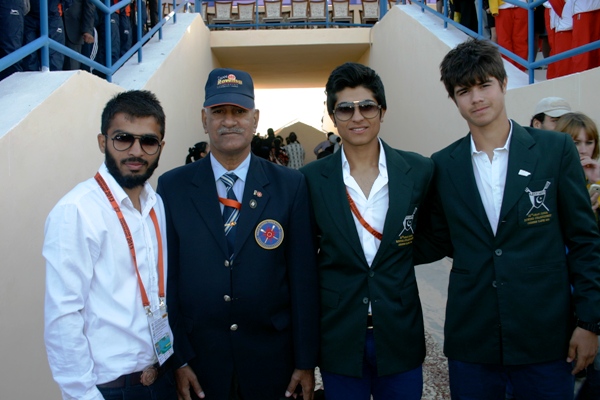
Mirror mirror on the wall, why has Pakistan's rowing team been forgotten by all?
“Did you know that Pakistani rowers made it to the Olympic selection event in 2013?” I laughed and choked, in shock!
“Did you know that Pakistani rowers made it to the Olympic selection event in 2013?”
Almost choking on my tea, I burst out laughing at my friend’s question. Regaining my composure, I replied,
“Pakistani rowers? Olympics? We don’t have rowers, much less international level rowers! Stop joking and let me drink my tea in peace.”
Unfazed, she said:
“Surprising isn’t it? But it is true. If you don’t believe me, try googling it and it will give you a list of our young rowers who made it to Uzbekistan in 2013.”
So I did google ‘rowing in Pakistan’.
Not only did I find the list of rowers who made it to the Youth Olympic Games (YOG) qualification event in 2013, I also realised how organised and structured the sport is in our country.
 Candidates participating in the Youth Olympic Games (Junior Asian Rowing Championship), 2013 in Samarkand, Uzbekistan. Photo: Manoucheher Siddiqui
Candidates participating in the Youth Olympic Games (Junior Asian Rowing Championship), 2013 in Samarkand, Uzbekistan. Photo: Manoucheher SiddiquiInterested in knowing more, I asked around and finally found someone who actually knew one of the young men who went to the qualification event. Excited, I arranged a meeting with him at the Karachi Boat Club (KBC), where he trains along with other rowers.
Walking into the KBC one evening, I was in awe at the sight of old and young men rowing energetically on the China Creek. Although I had noticed these rowers before, I had never realised that they rowed for anything but leisure.
The bubbles we live in, right?
A young boy walked towards me and introduced himself as Manoucheher Siddiqui and I realised that I was looking at one of the boys who had made it to the event. As we sat by the creek, he told me about his introduction into the world of rowing when he was merely 10-years-old.
In 2006 he transferred to the Centre for Advanced Studies (CAS) and joined the school rowing team. Since then he has participated in numerous regattas – both at home and abroad – from India to the Philippines to the most recent and most significant one in Samarkand, Uzbekistan.
Manoucheher’s love for travel and meeting people was apparent in the way he described his adventures,
“We have a training period before every regatta in the host country ranging from a week to a fortnight. Living together, eating together, learning each other’s languages and customs – it is a whole new experience! Many of my friends on social media are those who I met on these trips!”
All of that sounded like fun but I was concerned about his parents’ reaction and asked how he was able to manage between school and training.
He replied,
“My parents have always supported my rowing because it brought discipline into my life. I have to be at KBC, all geared up at 6am and we train six days a week for three hours each in the morning and evening. Both slots consist of one hour of land training – weights, dry-rowing and fitness – and two hours of water training.
I am here at 6am even on Sunday morning!”
He went on to explain that schools give special allowances and that his classes start an hour after regular time.
According to him, what has helped is the growing awareness and support in schools for sport. Once again, I was dumbfounded when he listed down the schools in Karachi that are registered with the KBC including the Karachi Grammar School (KGS), Centre for Advanced Studies (CAS), The Lyceum, Bayview High, St Patrick’s High School, Beacon House School Systems, Habib Public School, Institute of Business Administration (IBA), Institute of Business Management (IoBM) and Fatima Jinnah School among others.
It was unbelievable that all of this was being done for the sport and here I was completely unaware that it even existed in the country!
I could tell that he was dying to talk about his most recent regatta in Uzbekistan. He told me that he was one of three (under 19-years) rowers who had been selected from Pakistan and the others were Hassan Currimbhoy from Karachi and Abdul Rehman from Lahore.
 Manoucheher Siddiqui and Abdul Rehman at the YOG qualification in Samarkand, Uzbekistan. Photo: Manoucheher Siddiqui
Manoucheher Siddiqui and Abdul Rehman at the YOG qualification in Samarkand, Uzbekistan. Photo: Manoucheher SiddiquiThey had travelled to Samarkand for the Olympic qualification event with Mr Zohaib Hashmi, a rowing coach from Lahore in October, 2013.
He explained that the China Creek in Karachi is 1, 750 metres and this was the first time that they participated in a 2,000 metre race. Everything about the event was electronic – from the locked boats to the electronic start to the video finish – in order to ensure fair results. He said that rowing those 2,000 metres was the hardest thing he had ever done and all he could think at the time was,
“Why did I get myself into this?”
 Youth Olympic Games (YOG) qualification event inauguration in Samarkand, Uzbekistan. Photo: Manoucheher Siddiqui
Youth Olympic Games (YOG) qualification event inauguration in Samarkand, Uzbekistan. Photo: Manoucheher SiddiquiLaughingly, he said that this is a question he asks himself in most races, especially towards the end when his arms and legs are flailing under pressure. However, at the finish – especially after a win – that feeling changes to pure jubilation and he thinks,
“This is why I got myself into it. Now I know I can achieve this much more!”
Watching his face break into a smile, I felt a sense of pride in the achievements of these boys. It was that feeling that envelopes you when the Pakistan cricket team wins a match. These boys were making their country proud and I just could not understand why people like me had no idea of their accomplishments.
I thought maybe his coach, Mr Asghar, could answer this question and so I spoke to him as well. Mr Asghar turned out to be a passionate ex-rower himself who is now the lead coach at the KBC. I could tell from his expression how proud and grateful he was to the KBC for their efforts in promoting rowing in the country. But the same eyes became clouded with frustration as he explained the role of the Pakistan Rowing Federation (PRF).
The PRF is the national governing body for the development and promotion of rowing in Pakistan but being based in Punjab, preference is given to clubs and coaches from the province. In fact, in the recent Olympic qualification event, Mr Zohaib Hashmi from Lahore accompanied the contestants, while Mr Asghar was asked not to travel.
Looking at my confused expression, he explained that only one coach could accompany the contestants and since the PRF is based in Lahore, the coach chosen to travel was picked from Lahore as well; even though two of the three contestants were from Karachi. Shrugging his shoulders he said,
“The federation is from Punjab, things happen as they see fit.”
I felt infuriated at the PRF for being so petty, especially since this was such an important event for the country.
And what he told me next was enough to make me pull out my hair.
Apparently, the boys came in last in the first two races and the Lahore coach failed to identify the reason. It was only when Mr Ikram – Head of Rowing at KBC – arrived in Samarkand, that he noticed that they were putting all their strength in the beginning of the race and their stamina broke towards the end, causing them to fall behind.
 Pakistani participants with the Pakistan Rowing Federation umpire at the YOG qualification even in Samarkand, Uzbekistan. Photo: Manoucheher Siddiqui
Pakistani participants with the Pakistan Rowing Federation umpire at the YOG qualification even in Samarkand, Uzbekistan. Photo: Manoucheher SiddiquiThere have even been instances when Pakistan participated in international tournaments of which rowers in Karachi were not even informed like the World Championship held in Korea in May, 2013. A team of rowers from Punjab attended the tour.
And this is just the tip of the iceberg – rowers who wish to participate in international regattas have to bear all their travel and accommodation expenses themselves!
They also told me that only Karachi puts in so much effort for the advancement of this sport. Although Punjab has teams like the Pakistan Army, Pakistan Air Force (PAF), Pakistan International Airlines (PIA), Water and Power Development Authority (WAPDA), there is no investment to improve the quality of boats and equipment. On the other hand, the KBC offers rowing facilities to members and non-members alike. A rowing membership can be obtained for Rs4,500 while monthly charges are Rs400 per person.
KBC is also the proud owner of 35 world-class Italian and Chinese boats, constructed in carbon fibre and glass fibre to ensure lightness – the material used by all top rowing associations in the world. These boats weigh around 14.5 kilograms compared to the 35 kilograms wooden boats which can hardly move in water. Countries like India still use these bulky boats or ‘punishment boats’, as Manoucheher likes to call them since they are used by coaches when team members show lack of discipline.
Looking at the sleek boats, I felt like getting a rowing membership and trying my hand at the sport too!
As I bade farewell to them, I could not really put a finger on how I felt. I felt elated that these boys had made it to the Olympic qualifying event and had snagged the third position in their category. However, I felt a heavy sadness that the country to which they had brought such pride did not even acknowledge their accomplishments.
Manoucheher, like other young rowers, is already looking at universities abroad for sports scholarships that will help him refine his passion.
It seems that Pakistan is on the verge of losing another opportunity by showing a blind eye to this budding talent.
COMMENTS (9)
Comments are moderated and generally will be posted if they are on-topic and not abusive.
For more information, please see our Comments FAQ